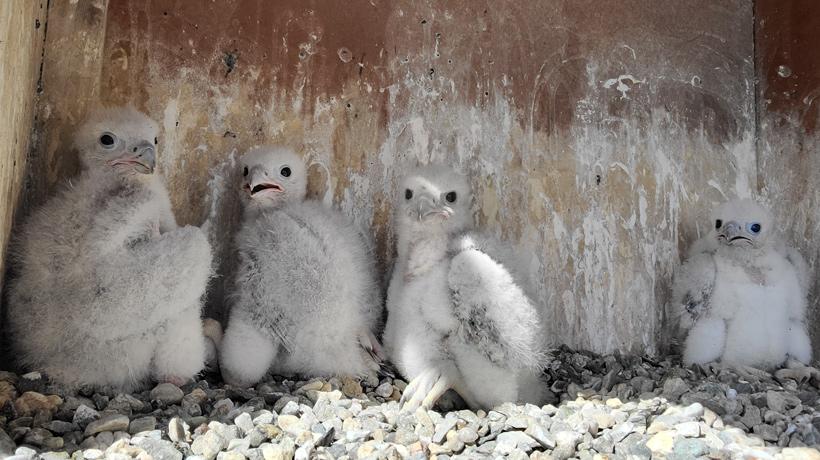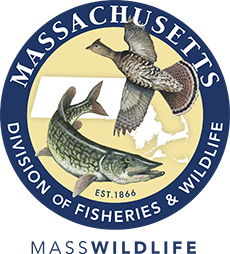- Division of Fisheries and Wildlife
- MassWildlife's Natural Heritage & Endangered Species Program
Media Contact
Media Contact, MassWildlife

Each spring,MassWildlife biologists monitor peregrine falcon nest sites across the state and band chicks. This nesting season presented a unique challenge when MassWildlifereceived word that a pair of peregrine falcons was nesting at an active construction site near Boston. After evaluating the scene, MassWildlife determined the safest course of action would be to relocate the four chicks to another nest in a more secure location at UMass Lowell.The UMass Lowell site was selected because of the nest suitability and the experienced nature of the current resident pair of peregrines. This year, the Lowell pair only successfully hatched one chick of their own, which allowed the four additional fostered peregrines to find a new home. MassWildlife is pleased to report that all five chicks have now successfully fledged under the watchful eyes of two experienced parents.
Because peregrine falcons fiercely protect their young and defend their territory, they consider their nest and what is inside to be theirs. Once placed in the nest, the fostered chicks become part of the clutch for that resident pair. The adults will provide food and security as the chicks collectively grow and begin to fledge. This care continues through fledgling as the young learn how to hunt and other important life skills from the adults. Fostering is an effective technique and is only utilized when there are no other options.
While the nesting season is not yet over, MassWildlife estimates that there are over 42 territorial pairs of peregrines statewide. Peregrine falcons nest on a wide range of modern structures including buildings, bridges, quarries, and a cell tower.This year, MassWildlife biologists banded over 40 chicks from 14 nests with small metal leg bands inscribed with a unique identification number. Staff use this information to track individual peregrines through observations reported by the public. This helps biologists learn about these protected birds’ movements, life span, breeding activity, and injury recovery. In fact, this year with the help of leg bandsMassWildlife biologists were able to determine the origins of the resident female at one of our natural cliff sites in the Berkshires. BM/18 was banded in 2019 on a rooftop nest in Jersey City, New Jersey. She now calls western Massachusetts home!
Web cameras are another useful tool to monitor peregrine nests for eggs, hatched chicks, and fledged chicks. There are six active nest cameras across the state, including one at UMass Lowell. While many of these nests have chicks that have already fledged this year, it is a fun way to engage with nature.
Peregrine falcons, the fastest birds on earth, are protected as a species of special concern under the Massachusetts Endangered Species Act. MassWildlife’s work to conserve peregrine falcons would not be possible without the support of the public, dedicated volunteers, and other conservation partners who assist in restoration efforts by monitoring nests and their young. 2022 marks the 36thyear of nesting peregrines here in Massachusetts since their reintroduction. Several public banding events occurred this season, which helped to renew community engagement and increase awareness about conservation in the Commonwealth.Click here to support the conservation of rare species like the peregrine falcon in Massachusetts.

